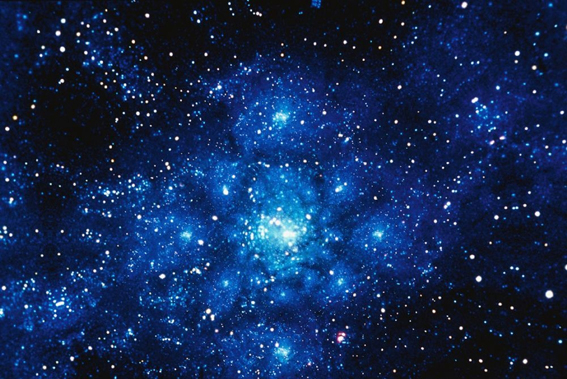Supernovae are significant to us in one other decidedly central way. Without them we wouldn't be here. You will recall the cosmological conundrum with which we ended the first chapter—that the Big Bang created lots of light gases but no heavy elements. Those came later, but for a very long time nobody could figure out how they came later.
超新星還有一方面對我們來說是絕對重要的。要是沒有了超新星,我們就不會來到這個世界上。你會想得起來,第一章快結束的時候,我們談到宇宙之謎--大爆炸產生了許多輕的氣體,但沒有創造重的元素。重元素是后來才有的,但在很長時間里,誰也搞不清它們后來是怎么產生的。

The problem was that you needed something really hot—hotter even than the middle of the hottest stars—to forge carbon and iron and the other elements without which we would be distressingly immaterial. Supernovae provided the explanation, and it was an English cosmologist almost as singular in manner as Fritz Zwicky who figured it out.
問題是,你需要有某種溫度確實很高的東西--比溫度最高的恒星中央的溫度還要高--來鍛造碳、鐵和其他元素;要是沒有這些元素,我們就令人苦惱地不會存在。超新星提供了解釋。這個解釋是一位幾乎像弗里茨•茲威基一樣行為古怪的英國宇宙學家作出的。
He was a Yorkshireman named Fred Hoyle. Hoyle, who died in 2001, was described in an obituary in Nature as a "cosmologist and controversialist" and both of those he most certainly was. He was, according to Nature 's obituary, "embroiled in controversy for most of his life" and "put his name to much rubbish." He claimed, for instance, and without evidence, that the Natural History Museum's treasured fossil of an Archaeopteryx was a forgery along the lines of the Piltdown hoax, causing much exasperation to the museum's paleontologists, who had to spend days fielding phone calls from journalists from all over the world.
他是約克郡人,名叫弗雷德·霍伊爾。霍伊爾死于2001年,在《自然》雜志的悼文里被描寫成一位"宇宙學家和好辯論的人",二者他都受之無愧。《自然》雜志的悼文說,他"在一生的大部分時間里都卷入了爭論",并"使自己名聲掃地"。比如,他聲稱,而且是毫無根據地聲稱,倫敦自然史博物館里珍藏的那件始祖鳥化石是假的,與皮爾當人頭蓋骨的騙局如出一轍,這使得博物館的古生物學家們非常惱火。他們不得不花了幾天工夫來回答記者們從世界各地打來的電話。
He also believed that Earth was not only seeded by life from space but also by many of its diseases, such as influenza and bubonic plague, and suggested at one point that humans evolved projecting noses with the nostrils underneath as a way of keeping cosmic pathogens from falling into them.
他還認為,地球不僅從空間接受了生命的種子,而且接受了它的許多疾病,比如感冒和腺鼠疫。他有一次還提出,人類在進化過程中有了突出的鼻子和朝下的鼻孔,就是為了阻止宇宙病原菌掉進去。











